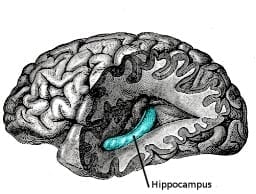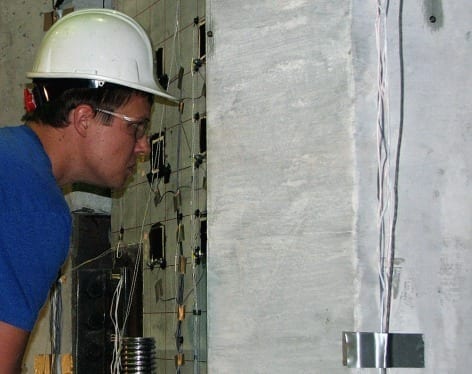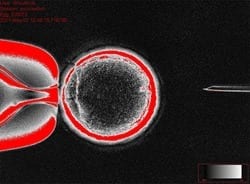When the brain’s primary “learning center” is damaged, complex new neural circuits arise to compensate for the lost function, say life scientists from UCLA and Australia who have pinpointed the regions of the brain involved in creating those alternate pathways — often far from the damaged site.
The research, conducted by UCLA’s Michael Fanselow and Moriel Zelikowsky in collaboration with Bryce Vissel, a group leader of the neuroscience research program at Sydney’s Garvan Institute of Medical Research, appears this week in the early online edition of the journal Proceedings of the National Academy of Sciences.
The researchers found that parts of the prefrontal cortex take over when the hippocampus, the brain’s key center of learning and memory formation, is disabled. Their breakthrough discovery, the first demonstration of such neural-circuit plasticity, could potentially help scientists develop new treatments for Alzheimer’s disease, stroke and other conditions involving damage to the brain.
For the study, Fanselow and Zelikowsky conducted laboratory experiments with rats showing that the rodents were able to learn new tasks even after damage to the hippocampus. While the rats needed more training than they would have normally, they nonetheless learned from their experiences — a surprising finding.
“I expect that the brain probably has to be trained through experience,” said Fanselow, a professor of psychology and member of the UCLA Brain Research Institute, who was the study’s senior author. “In this case, we gave animals a problem to solve.”
After discovering the rats could, in fact, learn to solve problems, Zelikowsky, a graduate student in Fanselow’s laboratory, traveled to Australia, where she worked with Vissel to analyze the anatomy of the changes that had taken place in the rats’ brains. Their analysis identified significant functional changes in two specific regions of the prefrontal cortex.
“Interestingly, previous studies had shown that these prefrontal cortex regions also light up in the brains of Alzheimer’s patients, suggesting that similar compensatory circuits develop in people,” Vissel said. “While it’s probable that the brains of Alzheimer’s sufferers are already compensating for damage, this discovery has significant potential for extending that compensation and improving the lives of many.”
The hippocampus, a seahorse-shaped structure where memories are formed in the brain, plays critical roles in processing, storing and recalling information. The hippocampus is highly susceptible to damage through stroke or lack of oxygen and is critically involved in Alzheimer’s disease, Fanselow said.
“Until now, we’ve been trying to figure out how to stimulate repair within the hippocampus,” he said. “Now we can see other structures stepping in and whole new brain circuits coming into being.”
Zelikowsky said she found it interesting that sub-regions in the prefrontal cortex compensated in different ways, with one sub-region — the infralimbic cortex — silencing its activity and another sub-region — the prelimbic cortex — increasing its activity.
“If we’re going to harness this kind of plasticity to help stroke victims or people with Alzheimer’s,” she said, “we first have to understand exactly how to differentially enhance and silence function, either behaviorally or pharmacologically. It’s clearly important not to enhance all areas. The brain works by silencing and activating different populations of neurons. To form memories, you have to filter out what’s important and what’s not.”
Complex behavior always involves multiple parts of the brain communicating with one another, with one region’s message affecting how another region will respond, Fanselow noted. These molecular changes produce our memories, feelings and actions.
“The brain is heavily interconnected — you can get from any neuron in the brain to any other neuron via about six synaptic connections,” he said. “So there are many alternate pathways the brain can use, but it normally doesn’t use them unless it’s forced to. Once we understand how the brain makes these decisions, then we’re in a position to encourage pathways to take over when they need to, especially in the case of brain damage.
The Latest Bing News on:
Neural-circuit plasticity
- In a first, mice brain circuits regenerated using rat stem cellson April 25, 2024 at 8:29 am
Two independent research teams have achieved successful regeneration of mouse brain circuits by cultivating neurons from rat stem cells.
- Rat cells grew in mice brains, and helped sniff out cookieson April 25, 2024 at 8:01 am
When implanted into mouse embryos, stem cells from rats grew into forebrains and structures that handle smells.
- Scientists regenerate neural pathways in mice with cells from ratson April 25, 2024 at 8:00 am
Two independent research teams have successfully regenerated mouse brain circuits in mice using neurons grown from rat stem cells. Both studies, published April 25 in the journal Cell, offer valuable ...
- Mapping the Neural Circuit of Social Avoidanceon April 25, 2024 at 7:51 am
Moving forward, Lin plans to continue studying this circuit to uncover other neuronal populations and brain regions that may contribute to social avoidance learning. She also wants to examine this ...
- Unraveling the neural circuit behind reduced food intake in high temperatureson April 23, 2024 at 8:24 am
In a study recently published in Nature, an international research team led by Karolinska Institutet and MedUni Vienna, addressed how and why acute heat exposure, in conditions reminiscent of a sauna ...
- Astrocytes found to play pivotal role in epileptic neuronal hyperactivityon April 22, 2024 at 8:57 am
Epilepsy, where patients suffer from unexpected seizures, affects roughly 1% of the population. These seizures often involve repetitive and excessive neuronal firing, with the trigger behind this ...
- Rethinking Neural Intelligence: Scientists Uncover Surprising Memory Capabilities of the Spinal Cordon April 21, 2024 at 5:32 am
Aya Takeoka and her team at the RIKEN Center for Brain Science in Japan have identified the neural pathways in the spinal cord that facilitate motor learning independently of the brain. Their research ...
- Unraveling Brain Dynamics: New Research Offers Hope For Neurodevelopmental Disorderson April 20, 2024 at 7:18 am
The University of Basel's research underscores the vital role of maintaining a delicate balance between neural excitation and inhibition in sensory perception.
- The spinal cord can learn and remember independently of the brainon April 13, 2024 at 6:20 am
Using the spinal cord for learning, particularly in the context of motor functions, is an exciting area of neuroscience ...
- Can Exercise Strengthen Brain Function? Here's What the Expert Shareson April 12, 2024 at 12:56 am
By incorporating many types of exercise into our lifestyle we can sharpen our minds preserve cognitive abilities and promote long-term brain health ...
The Latest Google Headlines on:
Neural-circuit plasticity
[google_news title=”” keyword=”neural-circuit plasticity” num_posts=”10″ blurb_length=”0″ show_thumb=”left”]
The Latest Bing News on:
Repairing brain damage
- Researchers create new, stronger way to repair lining of brain and spinal cordon April 26, 2024 at 12:51 pm
As neurosurgeons, we routinely open the dura to access the brain or spinal cord, but achieving a watertight seal of the dura after these procedures can sometimes be challenging,” said Kyle Wu, MD, a ...
- Limitations in Brain Repairon April 23, 2024 at 5:00 pm
We may more intelligently promote NPC compensation in adulthood by first examining injury to the developing ... Until the above issues are resolved, brain repair will not become a reality.
- Every New Memory You Make Causes Damage to Your Brain Cellson April 21, 2024 at 5:30 pm
New research reveals that the process of remembering something long-term comes at a cost – specifically, inflammation in the brain and DNA damage in nerve cells, as the memories get 'fused' into ...
- Brain Injury Newson April 18, 2024 at 5:00 pm
Brain Scans of Former NFL Athletes Show a Repair Protein in Place Long After Initial Injury Nov. 29, 2023 — In a new study using brain scans of former NFL athletes, researchers say they found ...
- Even mild inflammation can majorly damage the brainon April 16, 2024 at 7:30 am
A new study sheds light on how even mild inflammation can cause significant damage without directly killing the brain's neurons ...
- Brain Repairon April 10, 2024 at 8:21 pm
We are interested in mechanisms of neurodegeneration, neuroprotection and brain repair, and we try to find new ways to restore the damaged neuronal circuits and neurotransmission. We focus on studying ...
- Can Repairing Your Brain’s Wiring Help You Fight Addiction?on April 1, 2024 at 8:51 pm
What can new research tell us about addiction and the brain? Most important: Can what we’re learning help more people recover? “Not long ago the idea of repairing the brain’s wiring to fight ...
- How Does Brain Injury Damage Self-Love?on March 17, 2024 at 5:00 pm
reboot microglia to repair and sustain neurons, and reconnect our neural networks. Like the word “fatigue” doesn’t describe the neuro-fatigue after brain injury, rumination after brain ...
- Hope for brain damage suffererson February 7, 2024 at 4:00 pm
Experiments on animals have already revealed astonishing success in repairing brain damage with an injection of millions of these new cells, they said. Human trials are expected to be launched ...
- Mapping brain repair and remodeling after strokeon January 10, 2024 at 7:31 am
When their numbers are depleted by an injury, such as stroke ... "Finding a way to activate the brain's natural repair mechanism could improve the outcome for stroke patients," Garcia-Bonilla ...
The Latest Google Headlines on:
Repairing brain damage
[google_news title=”” keyword=”repairing brain damage” num_posts=”10″ blurb_length=”0″ show_thumb=”left”]










